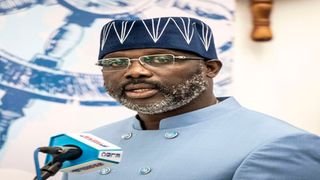
President of Liberia, George Weah talks to the press at the inauguration of the new Liberian International Ship and Corporate Registry building in Monrovia on November 19, 2021. President Weah conceded to opposition leader Joseph Boakai in the country's presidential election run-off.
| AFPOur Columnists
Premium
No one-term presidents here
On Friday, Liberia’s President George Weah conceded the election to opposition leader Joseph Boakai after a tight run-off race. Weah’s concession and its gracefulness are seen as likely to greatly help in ensuring a smooth transition of power in the West African nation once wracked by a long bloody civil war.
Weah thus entered the record books as one of a handful of African leaders who lost a presidential vote after one term and, perhaps, the third to concede without public bitterness. It was a welcome show from a former star footballer, three-time African Footballer of the Year and the first African to win the Ballon d’Or and be named Fifa World Player of the Year.
His presidency was marred by corruption allegations and his rule occasionally heavy-handed. On that form, many had expected rancour from him. It didn’t come.
Although the Weah move is rare in Africa, West and Southern Africa have seen a lot more of them than Central and East Africa. It is unheard of in North Africa.
In 2016, in Ghana, John Mahama, then the vice-president, succeeded John Atta Mills, who died in office on July 24, 2012, but was trounced by current President Nana Akufo-Addo. He left in a relatively dignified fashion.
In Nigeria, Goodluck Jonathan, who ascended to the presidency on May 5, 2010 following the death of President Yar’Adua, failed to close the deal. He was walloped in the March 15, 2015 poll by Muhammadu Buhari. He also walked off the stage without acrimony.
In Malawi, in June 2020, opposition leader Lazarus Chakwera scuttled incumbent Peter Mutharika’s second term dream. Mutharika had, in 2014, beaten Joyce Banda, yet another deputy who had succeeded a dead president and failed to defend the crown. Banda became president in April 2012 following the sudden death of President Bingu wa Mutharika (Peter Mutharika’s elder brother). Talk of dynasties.
More recently, in Zambia, Hakainde Hichilema routed President Edgar Lungu in the August 2021 election after the former’s first elected term. The Zambian separation has been quite quarrelsome.
The way East Africans make noise one would think the region has many first-term presidential tears, but no. If you count Somalia, then they have tasted it; although because so far it has held only indirect elections, they are imperfect comparisons. It is a tough place to get re-elected.
Long firm grip on power
East African ruling parties have had a long firm grip on power. Kenya, which has the region’s most freewheeling multiparty regime, has still not had an incumbent who didn’t get a second bite of the apple. Since 2002, both Mwai Kibaki and Uhuru Kenyatta went out with their parties because of the presidential two-term limit. Even then, presidential power has historically been held within a narrow 350-kilometre stretch in the centre of the country.
Why is East Africa politically frigid and West and Southern Africa less so? It is partly the old quandary about which came first; the chicken or the egg? In Senegal, in December 1980 Leopold Senghor retired, the first African president to leave office voluntarily. Then, it was such a rare thing the joke was that no African language had the words to describe what he had done.
Abdou Diouf, who became the next president, and perhaps the tallest African leader ever, was a soft-spoken gentleman who left in an orderly fashion after two terms. The seeds were planted in the region and then spread by the winds. Southern Africa’s proximity to Mauritius, a history of leaders leaving peacefully after two terms and not fighting tooth and nail to stay if defeated, also helped.
Nelson Mandela, for one, effectively left the presidency even before his first term ended. His deputy Thabo Mbeki succeeded him in the elections of 1999. That Mandela act remains a tough one to follow; no leader since has walked away voluntarily.
East Africa has not had such examples. The region’s foundational parties, especially in Kenya, Tanzania and Uganda, also had militant roots or links—either in uprisings like the Mau Mau or radical trade unions. One result of that is, the environment favoured leaders who came from a culturally or socially martial tradition.
Shakespeare-quoting and book-writing fellows like Tanzania’s Mwalimu Julius Nyerere were and still are a rarity in East Africa. West Africa had many of them—from Namdi Azikiwe in Nigeria to Senghor in Senegal. Even the revolutionary Kwame Nkrumah, in Ghana, carried himself about like a philosopher king.
Looking ahead, it will be many years before free and fair elections deliver one-term presidents in East Africa. Part of it has to do with the peculiar ways in which we count votes. When the dispatch of a president in a universal suffrage vote comes to East Africa, it is likely to be from a democratic Somalia that is warmly ensconced in the East African Community.
- Mr Onyango-Obbo is a journalist, writer and curator of the "Wall of Great Africans". @cobbo3





